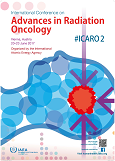Speaker
Layth Y. I. Mula-Hussain
(Zhianawa Cancer Center - Kurdistan Board for Medical Specialties)
Description
Background:
A radiation oncology training program is a critical element for capacity building of human resources in radiotherapy service worldwide. In spite of the great challenges facing Iraq, a war-torn country since early 1980s, the 1st high level of specialized training program in radiation oncology (4 year post-graduate board study program) was successfully established in mid-2013 under the aegis of the regional Ministry of Health and Ministry of Higher Education and Scientific Research. However, due to some gaps in some of the local expertise, a global outreach to institutes and individuals was approached and networking had been achieved to invite some of the internationally qualified experts to visit the training center and supplement locally available expertise. The authors here are trying to elaborate these efforts in advancing the level of radiation oncology training program in Iraq. It is hoped that this is of interest to the global radiotherapy community.
Methods:
Description of the efforts and expertise that joined the radiation oncology training program in Iraq.
Results:
After getting the approval to establish the 1st board program in radiation oncology in Iraq in late 2012, based in Zhianawa Cancer Center (ZCC) / Sulaymaniyah city, under the auspices of the Kurdistan Board for Medical Specialties (KBMS) and the real start of this program in July 2013 by accepting four trainees, networking was started by signing up some memoranda of understanding “MoU” with some training institutes / cancer foundations abroad and by approaching some of international experts to physically visit the training center on voluntary base for some period of time, to further support the local training program. As a result, four “MoU”s were signed with institutes / foundations in the USA, Canada, India and Turkey and seven colleagues accepted the invitation and joined the training program in Iraq for some periods of time, ranged from three days to two weeks. Together, this provided a comprehensive cover for the training requirements at that stage. The educational visits were achieved by the visits of experts in tumor pathology (from USA), in medical physics (from KSA and USA), in radiation oncology (from Jordan and Canada) and in clinical oncology (from UK). For the outcomes, we have achieved the following:
1. Launch of the Multi-Disciplinary Oncology Course (MDOC) Iraq series in its 1st copy for 5 days about general oncology in February 2015 and in its 2nd copy for 2 days about gynecology oncology in September 2016.
2. The 1st Best of ASTRO (BOA) Iraq meeting in December 2015, officially licensed by the American SocieTy for Radiation Oncology (ASTRO), where 90 top abstracts from the 2015 Annual ASTRO meeting have been presented in Iraq.
3. Launch of the 1st modern, high dose rate, 3D brachytherapy service in August 2016. This has established ZCC as a tertiary referral center for Iraq.
4. Receiving some trainees and staff from ZCC to get on-site attachment abroad (in the USA, India, Italy, Jordan and UK).
5. Covering the required 45 teaching hours in medical physics syllabus.
6. Sharing as external examiners in the Objective Structured Clinical Examination (OSCE) and the final exit practical exams and evaluations in ZCC and KBMS.
7. On-site patients’ consultation, remote consultation in addition to many
clinical teaching sessions.
Conclusions:
International networking has helped shape and advance the 1st radiation oncology training board program in Iraq. Within a carefully structured program, focused educational sessions / visits in addition to on-site / remote consultations were achievable and practical. Beside the education of the residents, the impact of these professional visits was extended to other oncology practitioners and to medical physicists and ultimately to our patients, through the increased quality of services provided. Given the difficult circumstances Iraq is going through over the last few years, this is considered a major progress. This knowledge sharing model can be transferred to other communities with similar challenges of limited budget and expertise.
| Institution | Radiation Oncology Program, Zhianawa Cancer Center – Kurdistan Board for Medical Specialties, Sulaymaniyah, Kurdistan, Iraq |
|---|---|
| Country | Iraq |
Author
Layth Y. I. Mula-Hussain
(Zhianawa Cancer Center - Kurdistan Board for Medical Specialties)
Co-authors
Abdulla Alhasso
(The Beatson West of Scotland Cancer Center)
Akhtar N. Shamsaldin
(Zhianawa Cancer Center - Kurdistan Board for Medical Specialties)
Imad Jaradat
(King Hussein Cancer Center)
Michael D. Hughson
(University of Mississippi Medical Center)
Mustapha Chelfi
(Gatineau Cancer Center)
Muthana Al-Ghazi
(Chao Family Comprehensive Cancer Center - School of Medicine, University of California, Irvine)
Saad S. Tahir
(Broomfield Hospital)
Shada Wadi-Ramahi
(King Faisal Specialist Hospital and Research Center)

